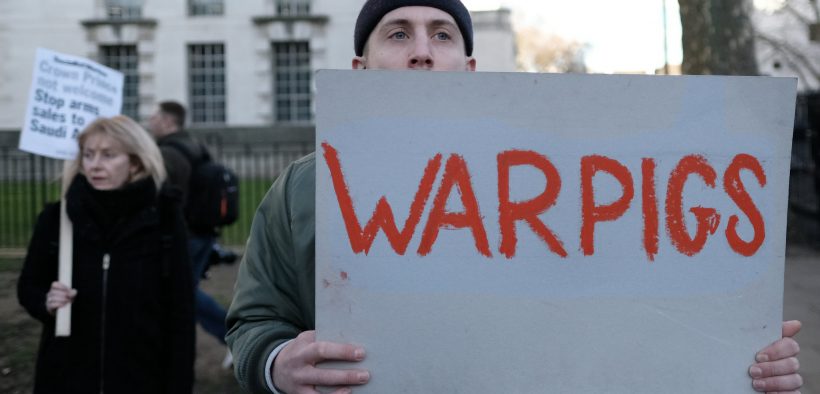France Threatens Journalists For Publishing Leaked Documents on French Role in Yemen War

“They want to make an example of us because it’s the first time in France that there have been leaks like this.”
French investigative journalists are facing imprisonment for exposing, through the use of an unprecedented leak of classified documents, the government’s involvement in the Yemen War.
The three journalists from Disclose and Radio France uncovered the number of French arms sold to Saudi Arabia and the United Arab Emirates (UAE) and published their report on the investigative website Disclose last month.
The April report was published in concert with The Intercept, Mediapart, ARTE Info, and Konbini News. The publications jointly revealed the vast amount of French, British, and American military equipment sold to Saudi Arabia and the United Arab Emirates, and used in the Yemen War.
The documents in the French report were obtained from France’s Directorate of Military Intelligence (DSGI), though they have refused to reveal their sources. The files showed that senior French officials had lied about the role of France’s weapons in the Yemen War which has gone on for over five years.
The publications revealed that the Emmanuel Macron administration deliberately denied or pretended it did not know that French weaponry, including French-supplied CAESAR howitzer artillery, tanks and laser-guided missile systems, were used for offensive purposes in Yemen in 2014.
France is one of Saudi Arabia’s leading arms supplier, besides the U.S. According to France’s Ministry of Defense data, Saudi Arabia bought French weapons worth more than 11 billion euros ($12.6 billion) between 2008 and 2017.
Journalists Refused to Reveal the Sources
Disclose’s co-founders Geoffrey Livolsi and Mathias Destal and Radio France journalist Benoît Collombat attended a hearing at the request of the DSGI after the publication of their report.
At the hearing, they refused to reveal the source of the leaked DSGI files. They defended freedom of the press and the rights of whistleblowers in the hearing, saying that their works were in the public interest. Reporters have rights to keep their sources confidential under a French press law enacted in 1881.
However, the law does not apply to cases of national security. Hence, the journalists could face a five-year sentence under a French law enacted in 2009 for mishandling classified documents without prior authorization.
“They want to make an example of us because it’s the first time in France that there have been leaks like this,” Livolsi told the Intercept.
Publications Inspired Rights Group to Block Arms Shipment to Saudi
Almost two weeks ago, two France-based rights groups tried to block the loading of weapons onto a Saudi cargo ship docking in Northern France, arguing that the ship violated an international arms pact.
Reuters reported that the groups’ blockage took place following the publication of the report on French arms sales on Disclose. One of the organizations in charge of that blockage, ACAT, admitted having pledged a lawsuit to prevent the loading of weapons onto the Bahri-Yanbu vessel, a cargo serving Saudi’s Defense Ministry and Interior Ministry.
The other rights group, ASER, also filed a lawsuit at a different court, using a law that states, “one country cannot authorize the transfer of weapons if, at the time of the authorization, the country knew that weapons could be used to commit war crimes.”
Prominent rights groups like Amnesty International condemned France’s arms sales to Saudi Arabia. The London-based rights organization also slammed Macron for not being trustworthy, claiming the president keeps changing his discourse.
“We were told the arms were only used for defensives purposes, and all of a sudden we’re being told ‘we never said there weren’t any French weapons being used in Yemen, we said we didn’t have proof that French weapons were used to kill civilians. So, France’s word is a vast gibberish, we cannot trust what they say,” Aymeric Elluin, Amnesty’s advocacy officer for weapons and international justice, said as quoted on PressTV.
Facing mounting pressure, Macron admitted that the weapons were used for war, but only on the Saudi border.
“I would like to say here that what we reiterated was the guarantee for them (the arms) not be used against civilian populations,” the young president said.
The Yemen War and the Role of Western-Made Weapons
The Yemen War broke out in 2014 when the Houthi rebels expelled the U.S.-backed Abd-Rabbu Mansour Hadi after the end of the late Ali Abdullah Saleh regime. Saleh was shot to death at the end of 2017.
The non-profit organization Armed Conflict Location and Event Data Project (ACLED) claimed that as of December 15, 2018, approximately 60,000 Yemenis have died directly from the conflict, excluding 85,000 children who died possibly from famine in the last three years. But ACLED says the death toll in Yemen could reach six times higher than the official figure from the United Nations.
The humanitarian crisis in Yemen is benefiting the arms trade and U.S. and the Western countries that supply arms to Saudi Arabia and the United Arab Emirates (UAE), which formed a coalition aimed at crushing the alleged Iran-backed Houthi rebels.
According to the Disclose report, Western-manufactured weapons have been used in offensives that killed innocent civilians in Yemen, debunking claims from the U.S. and France that said their weapons were used for defense purposes only.
France is also one of the signatories of a U.N. pact that prohibits arms sales that aid war crimes and human rights violations.



















